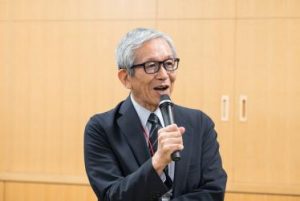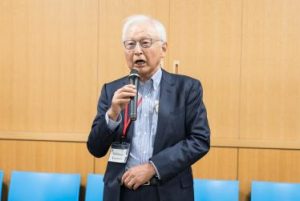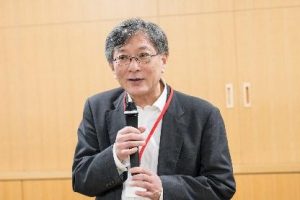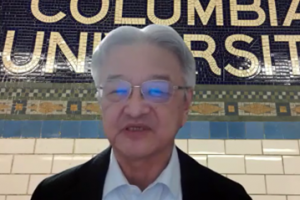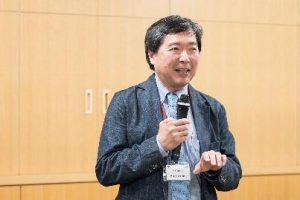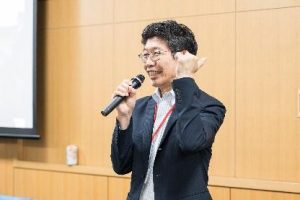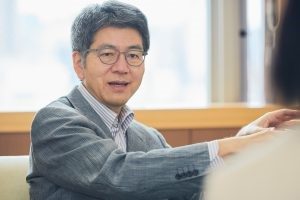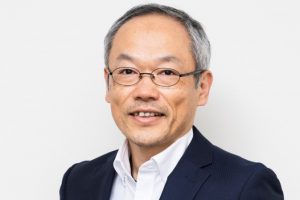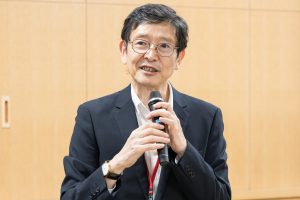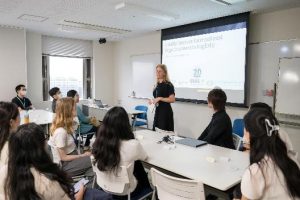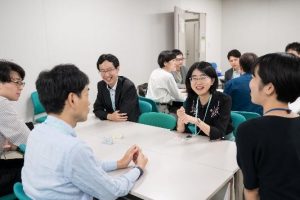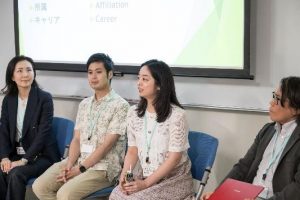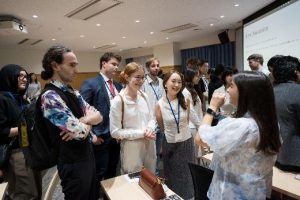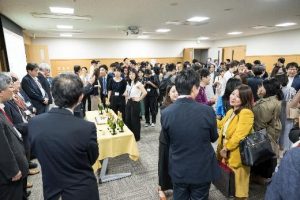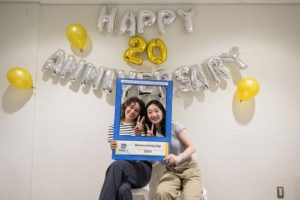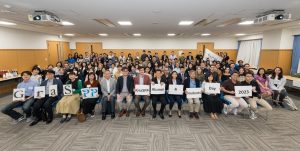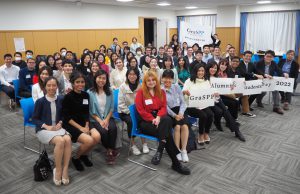Homecoming Day

About 150 GraSPPers gathered for GraSPP Alumni & Students Day 2024 on the evening of Saturday, October 19, commemorating the 20th anniversary of the school’s founding and deepening friendships.
Following the opening remarks and greetings, President Fujii dropped by and gave a surprise congratulatory speech on the 20th anniversary of the GraSPP’s founding. In the following panel session, “How do GraSPPers contribute to global public policy?”, alumni panelists active in industry, academia, and government took the stage and shared their memories of their time at GraSPP and their experiences after graduation, moderated by Professor Yasutora Watanabe and Student Council member Wanonno Iqtyider.
After that, the event was divided into five field-specific parallel sessions, which provided an opportunity for alumni and current students to expand their networks and discuss topics such as “international organizations,” “policy planning,” “business and social entrepreneurship,” “research and innovation,” and “career opportunities for international students in Japan.”
The final social gathering included a 20th anniversary cake cutting, greetings from former deans, and a GraSPP quiz session organized by the Student Council, allowing alumni, current students, faculty and staff to deepen their friendships.
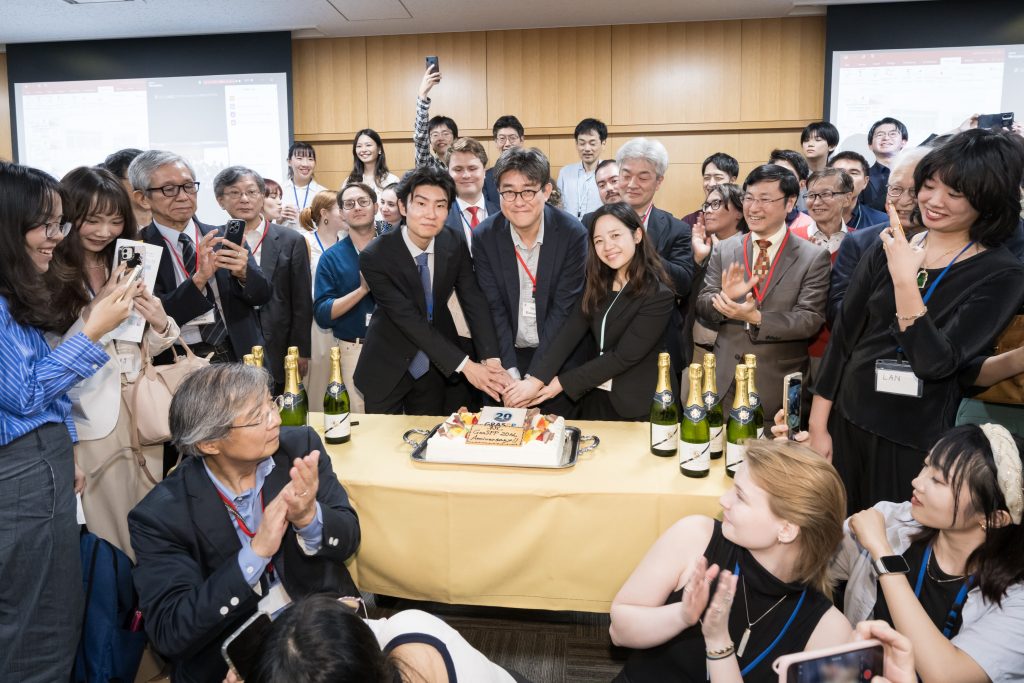
Striratna “Tita” Nityahayu, President, Alumni Association (Class of 2022)
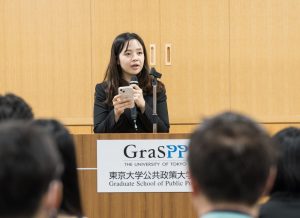 Distinguished GraSPP Deans, professors, and staff members, my fellow alumni and students, my name is Striratna Nityahayu, known as Tita, and I am serving as the President of the GraSPP Alumni Association. I graduated in 2022, so I studied here during the peak of the Coronavirus spread and missed many chances to interact with my peers in real life. Therefore, it is a tremendous honor to be able to host this Homecoming Day this year with GraSPP and GraSPP Student Council and see your bright faces here once again, or even for the first time.
Distinguished GraSPP Deans, professors, and staff members, my fellow alumni and students, my name is Striratna Nityahayu, known as Tita, and I am serving as the President of the GraSPP Alumni Association. I graduated in 2022, so I studied here during the peak of the Coronavirus spread and missed many chances to interact with my peers in real life. Therefore, it is a tremendous honor to be able to host this Homecoming Day this year with GraSPP and GraSPP Student Council and see your bright faces here once again, or even for the first time.
I hope this will not be our last. I look forward to gathering with you again on another happy occasion like today, our school’s 20th anniversary. I hope you will enjoy this evening—reconnecting, making new friends, and sharing knowledge and expertise that will improve our society—we are a public policy school, after all—but please do not forget to have fun!—we have prepared meals and drinks for you to enjoy.
Lastly, as the Alumni Association President, I do have a request. Please contact the Association secretariat or me with any ideas for the next events. Thank you so much!
Itsuki Shimoosako, President, Student Council (First-year student joining in 2024)
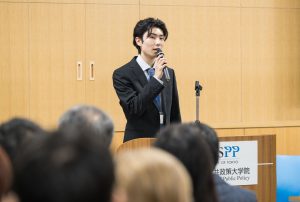 Hello, My name is Itsuki Shimoosako, and on behalf of the Student Council and the student body, I’d like to warmly welcome you all to Homecoming Day. It is truly an honor for me to stand before you as we gather to celebrate the 20th anniversary of the GraSPP at The University of Tokyo. As we celebrate GraSPP’s 20th anniversary, today’s Homecoming Day theme is to reflect on the past two decades while also looking forward to the next twenty years.
Hello, My name is Itsuki Shimoosako, and on behalf of the Student Council and the student body, I’d like to warmly welcome you all to Homecoming Day. It is truly an honor for me to stand before you as we gather to celebrate the 20th anniversary of the GraSPP at The University of Tokyo. As we celebrate GraSPP’s 20th anniversary, today’s Homecoming Day theme is to reflect on the past two decades while also looking forward to the next twenty years.
Over the past twenty years, GraSPP has established itself as a leading public policy school, a member of the GPPN, with a strong curriculum focused on practical learning and a global perspective. However, what truly makes GraSPP special are the inspiring individuals within this community. I think that we all share a vision of contributing positively to society, and this shared vision continues to connect us and drive GraSPP forward. As we look toward the next twenty years, we are confronted with new major global challenges. Thus, I believe that Public policy practitioners must continue to adapt and innovate to address these issues and this Graduate School.
I am particularly excited about today’s panel discussion, where our alumni will share their perspectives on this topic. Lastly, I hope today provides an opportunity to reconnect with old friends and professors, build new relationships, and strengthen our shared identity as GraSPPers. Thank you, and please enjoy the day!
Daiji Kawaguchi, Dean, GraSPP
 I would like to briefly share what we have discussed during the past 10 months with faculty and staff members. I would like to give you the background on what faculty and staff think about our mission for the next two decades so that alumni and students can discuss the same. GraSPP was born in 2004. At that time, our student body was around 100 per cohort; most were Japanese. However, afterward, GraSPP became internationalized, and the student body became more diverse, accepting more international and mid-career students.
I would like to briefly share what we have discussed during the past 10 months with faculty and staff members. I would like to give you the background on what faculty and staff think about our mission for the next two decades so that alumni and students can discuss the same. GraSPP was born in 2004. At that time, our student body was around 100 per cohort; most were Japanese. However, afterward, GraSPP became internationalized, and the student body became more diverse, accepting more international and mid-career students.
At the same time, the policy environment has changed drastically in the last two decades. Firstly, we have experienced changes in the global and international policy environment, and we can clearly see that the policymaking process of the Japanese government has changed quite drastically. In 2004, the policy was made through the bottom-up process: the bureaucrats prepare an idea, and the politicians decide. However, the roles have reversed: the politicians have an idea, and the bureaucrats implement the policy. The change in the policymaking process has been quite significant in the last two decades, and data and scientific evidence have also become available, so evidence-based policymaking has become more important in the process.
The environment surrounding higher education or research universities has also changed. International university ranking has become more critical in the central government’s decision-making about allocating resources, so international competition has become more intense in the last two decades. That’s the changes in the environment surrounding higher education around the world.
GraSPP has grown from infancy to adulthood in 20 years. The environment will further change in the next 20 years. For example, we may see intensifying geopolitical tensions and challenges to free and open market economies. Through education and research, GraSPP can lead efforts to address the challenges posed by global warming, social adaptation to rapid technological progress, and social divisions fueled by social media.
Considering the next twenty years, GraSPP needs to update its mission to address some current issues. There have been changes in student composition and interests, the increasing importance of problem-solving and leadership skills, and intensifying competition with international rival schools. On the research front, we have seen increasing research with international impacts and the need to communicate research output to society.
We will redefine and update GraSPP’s mission. We aim to improve public policy through educating leaders and impactful scientific research, educating leaders who can identify the broad spectrum of local and global challenges, developing strategies to tackle these issues, and creatively solving problems. We will improve the quality of public policy through scientific research.
Teruo Fujii, President, The University of Tokyo
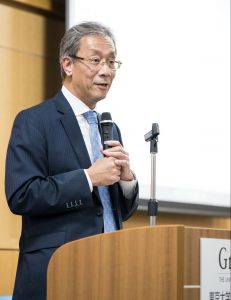 Let me first congratulate the GraSPP on reaching this milestone in its history. Congratulations!
Let me first congratulate the GraSPP on reaching this milestone in its history. Congratulations!
I express my utmost respect to all those dedicated to ensuring that the school continues to be at the forefront of nurturing talents in public policy.
I first worked closely with GraSPP at the launch of the University of Tokyo’s Ocean Alliance in 2007. Since then, I’ve been impressed by a history of GraSPP’s achievements.
GraSPP was created in 2004 through the entrepreneurial spirit and leadership of its founding dean, professors, and staff, aiming to nurture leaders in Japanese society. It has continued to develop through the sustained efforts of its subsequent deans, professors, and staff and has transformed to broaden its role of nurturing leaders worldwide. The organizational transformation over the past twenty years has been phenomenal.
Internationalization has been a top priority for The University of Tokyo as a whole, and we now aim to establish the “College of Design”. The creation of the College of Design is one of the major initiatives that The University of Tokyo has been considering as part of its efforts to create a new university model. In today’s increasingly complex and diverse society, we need exceptional individuals who can take the initiative to tackle global challenges facing human society and those with innovative mindsets who can play the changemaker role for the future. The College of Design will provide a place for interdisciplinary learning and problem-solving that transcends existing academic disciplines. It will focus on “design” in its broadest sense, including the transformation of social systems. Classes will be conducted in English at the College of Design. Students can learn independently according to their interests and issues. Applicants for the College are sought from all over the world, including those from Japan. We plan to open the College of Design in the autumn of 2027.
GraSPP’s pioneering efforts and achievements will significantly contribute to this university-wide initiative to create the College of Design, a new university model. Our alumni and students are a valuable intangible asset. We would like your support and cooperation in various ways to make The University of Tokyo a frontier player globally. Let me once again congratulate all the GraSPPers on the 20th anniversary and express my appreciation to all those who have dedicated their time and effort to the school’s phenomenal contribution to nurturing public policy professionals. Finally, I wish the GraSPP’s next 20 successful years to remain a pioneering educational and research hub.
Participants’ voices and messages

“As you would expect from a public policy graduate school, there was diversity in the participants, with people from various backgrounds. They were contributing to new areas of the public sector across fields, playing a role in giving back to society and creating knowledge while being close to business and the field.”
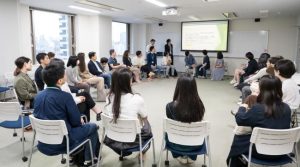 “I was pleasantly surprised that President Fujii attended. Participating as a panelist in the panel discussion and interacting with seniors and juniors.”
“I was pleasantly surprised that President Fujii attended. Participating as a panelist in the panel discussion and interacting with seniors and juniors.”
“There were so many people that we didn’t have enough time or space, but it was good that everyone’s enthusiasm was shared. I think this is the start of a new alumni association.”
“I was surprised at how much they had evolved since we were enrolled. There were also various opportunities for interaction, and I felt the benefits of attending in person.”
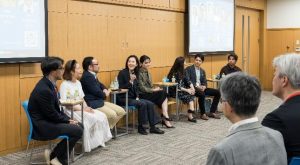 “I felt the development of the graduate school!”
“I felt the development of the graduate school!”
“It was good to have many questions from students interested in research.”
“It was good that many alumni attended, as it was the 20th anniversary of GraSPP. Also, it was very nostalgic and nice to have the past deans attend the social gathering.”
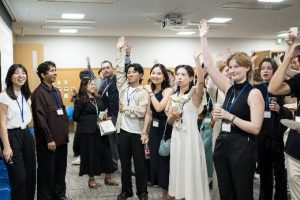 “It was an interesting opportunity to meet former and present students of GraSPP. Not only that, but I was also able to meet with the alumni speakers and professors in person and discuss various topics with the participants.”
“It was an interesting opportunity to meet former and present students of GraSPP. Not only that, but I was also able to meet with the alumni speakers and professors in person and discuss various topics with the participants.”
“At the milestone of our 20th anniversary, it was a very valuable time for alumni, current students, professors, and past deans to gather in this way and seriously discuss the school’s future. I was inspired by the innovative and powerful energy of the lively alumni active in various fields. It was also wonderful that they created a timeline of GraSPP!”
“I was able to connect with alumni employed in the same place and make lunch arrangements with people near my workplace to expand my network.”
“The students who organized the event were very hard-working, and I liked them. It was also good that we could interact with current students.”
Megumi Hashiguchi, GraSPP Alumni Desk
Congratulations! Society has changed dramatically in the 20 years since GraSPP was established. Countries of origin, fields of study, and students’ career paths after graduation have changed gradually. In human terms, this is when children grow up and become independent adults. Our homecoming day serves as a place where talented graduates who are active in various fields of society can share the joy of reunion, as a place for new encounters with people who graduated in different years and people who were not connected during their time at the university. As a place to share and exchange information on social issues, the alumni organization will be able to establish a platform and operate autonomously to respond to the diversity that grows year by year with the number of graduates. As the person in charge of the alumni association, I will do my best to support this. Also, I would be grateful if you could continue supporting your alma mater’s development.
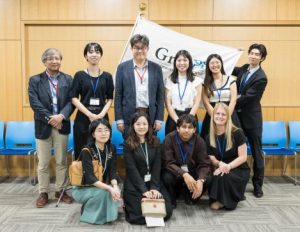
All alumni, students, faculty, and staff members of GraSPP are invited to register on the GraSPP Alumni Association website if you have yet to do so. This platform is designed to connect GraSPP community members from around the world. The Association welcomes volunteers who want to help upgrade and enhance the website.
Please register here: https://www.grasppalumni.com/


